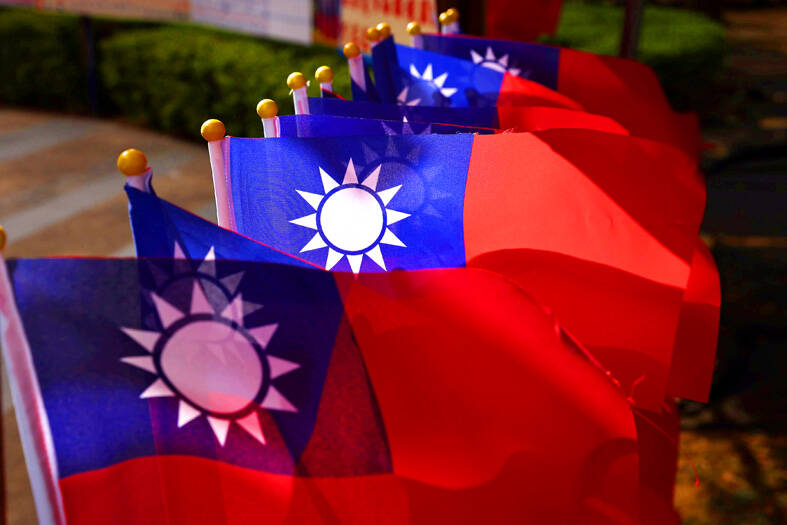Democratic Progressive Party (DPP) Legislator Chen Kuan-ting (陳冠廷) has proposed an amendment to the National Security Act (國家安全法) that would increase the minimum punishments for treason.
Article 7 of the act states that “any person, who intends to endanger national security or social stability and commits an offense” such as espionage or the sharing of national secrets with a foreign force would face up to seven years in prison and a fine of NT$50 million to NT$100 million (US$1.56 million to US$3.12 million).
Chen proposed increasing the minimum prison term to 10 years and the minimum fine to NT$100 million to deter those who would spy on behalf of the Chinese Communist Party (CCP). The amendment would also increase the maximum fine to NT$200 million.

Photo: Ann Wang, Reuters
He also proposed expanding the scope of information-sharing that would be considered a crime in the act.
Article 2 currently lists “confidential documents, drawings, images, messages, articles or electromagnetic records that are for official use.”
That should be expanded to include items that “should be kept secret for national security or public interests,” Chen said.
He also proposed amending the National Intelligence Service Act (國家情報工作法) to require the establishment of specialized national security courts to be handled by judges with professional knowledge related to national security.
The judges would receive a certain number of hours of national security-related training, and would undergo annual courses, he said.
Separately, DPP Legislator Puma Shen (沈伯洋) and others proposed a draft amendment to the Act Governing Relations Between the People of the Taiwan Area and the Mainland Area (台灣地區與大陸地區人民關係條例) that would require the revocation of long-term residency rights of Chinese spouses found to present a national security risk.
Under the proposal, those found to have committed offenses of civil strife or foreign aggression as stipulated in the Criminal Code would be deported.
However, those deemed to present a national security risk, but who have not committed any crime, would only have their long-term residency rights revoked and would be permitted to remain in Taiwan as a dependent of their spouse.
Crimes to which the amended measures would apply would include developing organizations for the CCP or stealing business secrets from companies producing core technologies, as stipulated in the National Security Act, Shen said.
The measures would also apply to those who have contravened the National Intelligence Service Act by delivering confidential information to China, and those who have breached the Anti-infiltration Act (反滲透法) by intervening in election activities and have been prosecuted, or received deferred prosecution, he said.

GAINING STEAM: The scheme initially failed to gather much attention, with only 188 cards issued in its first year, but gained popularity amid the COVID-19 pandemic Applications for the Employment Gold Card have increased in the past few years, with the card having been issued to a total of 13,191 people from 101 countries since its introduction in 2018, the National Development Council (NDC) said yesterday. Those who have received the card have included celebrities, such as former NBA star Dwight Howard and Australian-South Korean cheerleader Dahye Lee, the NDC said. The four-in-one Employment Gold Card combines a work permit, resident visa, Alien Resident Certificate (ARC) and re-entry permit. It was first introduced in February 2018 through the Act Governing Recruitment and Employment of Foreign Professionals (外國專業人才延攬及雇用法),

WARNING: From Jan. 1 last year to the end of last month, 89 Taiwanese have gone missing or been detained in China, the MAC said, urging people to carefully consider travel to China Lax enforcement had made virtually moot regulations banning civil servants from making unauthorized visits to China, the Control Yuan said yesterday. Several agencies allowed personnel to travel to China after they submitted explanations for the trip written using artificial intelligence or provided no reason at all, the Control Yuan said in a statement, following an investigation headed by Control Yuan member Lin Wen-cheng (林文程). The probe identified 318 civil servants who traveled to China without permission in the past 10 years, but the true number could be close to 1,000, the Control Yuan said. The public employees investigated were not engaged in national

The zero emissions ship Porrima P111 was launched yesterday in Kaohsiung, showcasing the nation’s advancement in green technology, city Mayor Chen Chi-mai (陳其邁) said. The nation last year acquired the Swiss-owned vessel, formerly known as Turanor PlanetSolar, in a bid to boost Taiwan’s technology sector, as well as ecotourism in Palau, Chen said at the ship’s launch ceremony at Singda Harbor. Palauan President Surangel Whipps Jr and Minister of Foreign Affairs Lin Chia-lung (林佳龍) also attended the event. The original vessel was the first solar-powered ship to circumnavigate the globe in a voyage from 2010 to 2012. Taiwan-based Porrima Inc (保利馬) installed upgrades with

ENHANCE DETERRENCE: Taiwan has to display ‘fierce resolve’ to defend itself for China to understand that the costs of war outweigh potential gains, Koo said Taiwan’s armed forces must reach a high level of combat readiness by 2027 to effectively deter a potential Chinese invasion, Minister of National Defense Wellington Koo (顧立雄) said in an interview with the Chinese-language Liberty Times (sister newspaper of the Taipei Times) published yesterday. His comments came three days after US Secretary of State Marco Rubio told the US Senate that deterring a Chinese attack on Taiwan requires making a conflict “cost more than what it’s worth.” Rubio made the remarks in response to a question about US policy on Taiwan’s defense from Republican Senator John Cornyn, who said that Chinese